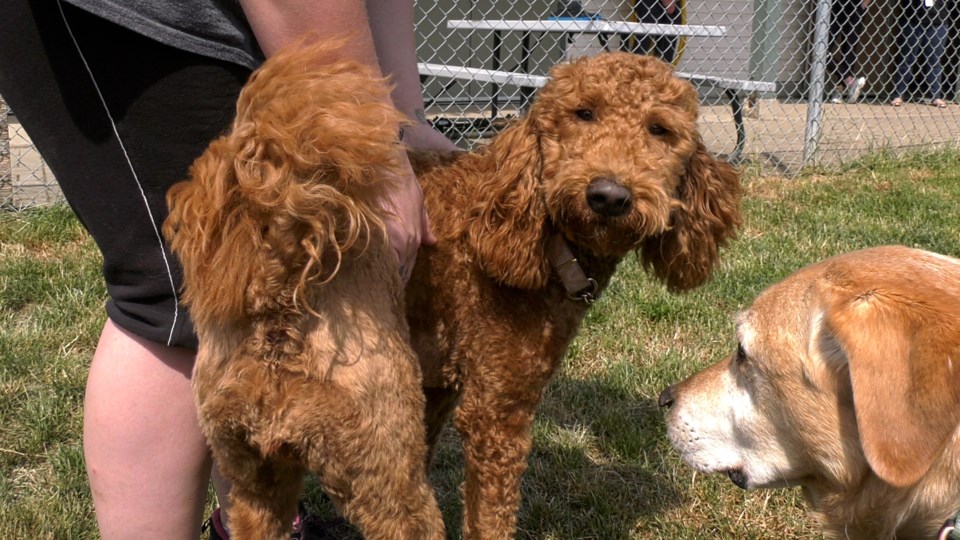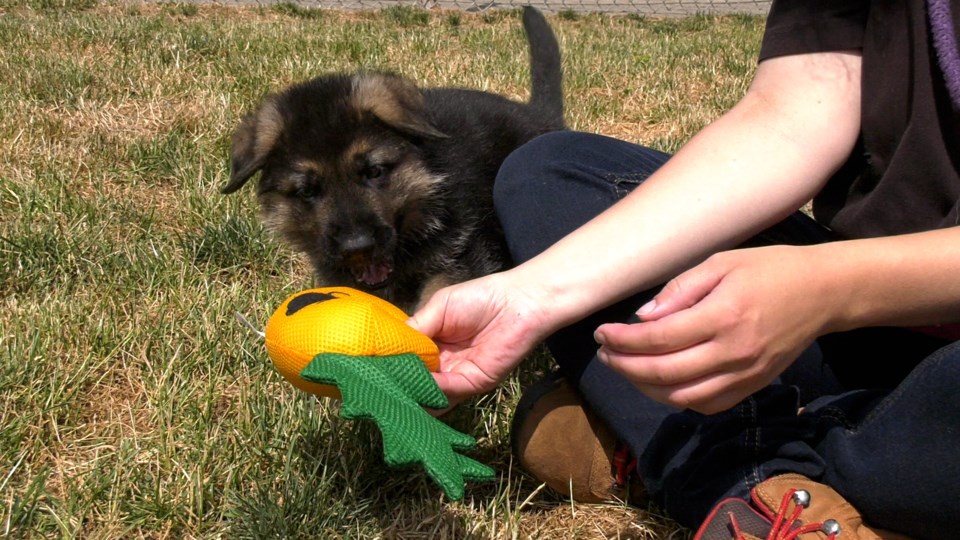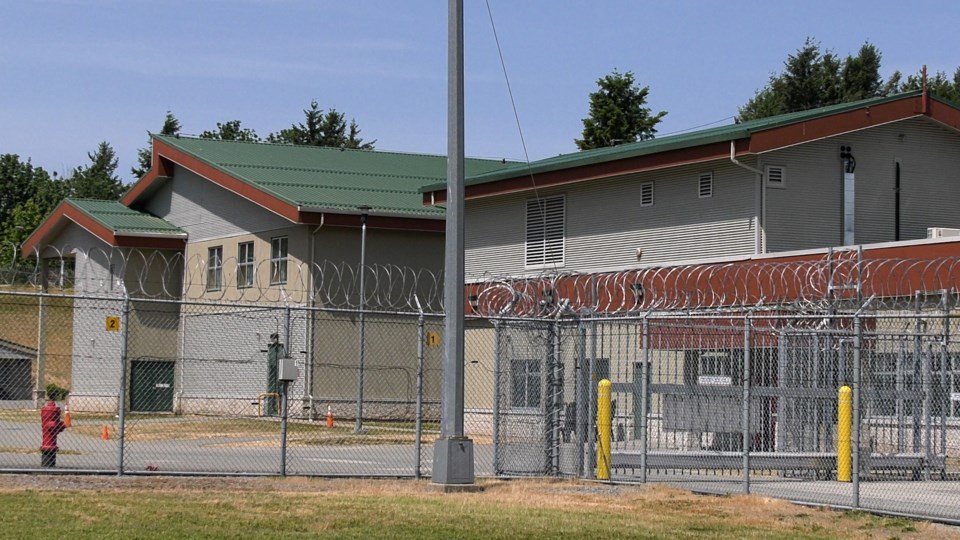It's just before 10 a.m. on a sunny June morning.
A woman rushes to get her belongings from the back of her vehicle, parked outside a high-security prison fence in Abbotsford. She's at the Fraser Valley Institution, a facility for women offenders, to drop off her dog. She's one of many who will hand over the care of her pet to inmates for the day.
It's all part of the Doghouse program, a partnership between the .
“This is an amazing program. It's very unique,” says program manager Alicia Santella, noting more than 400 women have taken part. The program has been running since 2006, allowing prisoners to take care of the public's pets, either just for the day or overnight boarding.
One of the benefits is providing the women with valuable skills that can be used after their sentence.
"It's a great program that provides vocational skills training for the women, as well as service to the community,” says Chris Szafron, assistant warden at Fraser Valley Institution.
According to Szafron, it's the only program of its kind in Canada, something he's "very proud of."
The Fraser Valley Institution has minimum, medium and maximum units. Offences range from drug-related crimes to dangerous offenders.
“It's nice to see them be able to turn their lives around,” says Szafron.“It's been a great enterprise for everybody who's involved.”
Prisoners trained to care for dogs
Santella believes the program can be a catalyst for change in the people who participate.
“It’s an opportunity for a second chance, learning from mistakes,” she says.
Women in the Doghouse program also get to train the dogs and do so in a non-judgmental capacity. Depending on the duration of their sentence, they can work on more advanced training.
“Those skills that they learn are managed by myself and another instructor,” says Santella.
The skills the women learn can be applied to working at a kennel. Currently, in the dog kennel industry, there is no certificate or standards businesses need to meet.
“It helps them be better equipped when they're out looking for a job in the industry that they can have that Langley Animal Protection Society skills behind them,” says Santella.
The program offers kennel attendant level one and two certificates, dog grooming and dog training.
The inmates learn to clean kennels, feed the animals and medicate them safely. Another certificate covers the safe handling of dogs, where the individual does a canine first-aid certificate. There is also a grooming certificate, where they can learn basic grooming skills, bathing and blow drying techniques and nail clipping. Lastly, inmates can take part in a variety of dog training skills using positive-based reinforcement.
“The [dogs] get a lot of attention, sometimes more than they get even at home,” says Santella, adding around 20 women go through the training each year.
Dogs are taken out for walks, can take part in a dog play group with compatible dogs and if requested can go back to the inmate's room instead of staying at the kennel.
“Both our clients as well as the women who participate can sort of feel good that while they're using the services, and the dogs are getting amazing care,” she says.
The Doghouse initiative daycare costs $25 to 30 and boarding is $35 with "anything that is left over" going back into LAPS.

Inmates forever changed by doggy daycare program
A rescue German Shepard puppy named Comet is being cared for at the institution.
Santella says shelter dogs can come in and participate in the program.
“What that means for the kennel worker who is looking after that particular dog is they have an opportunity to teach that dog valuable skills that will help it get adopted into the community,” she says.
The inmates work on leash manners, not jumping up, and being around other dogs. It also gives the women a chance to interact with the public.
"That's a great way for [inmates] to build their skills working with members of the public in the community,” she says. “Which will help them with reintegration when they're ready."
A woman in the program named Amanda has been helping with Comet. She transferred to Fraser Valley Institution from a prison in Edmonton and says the program has changed her life.
"If it weren't for this program, I don't know what would become of me right now,” she tells Glacier Media. "I have something to look forward to every day."
Amanda, 37, battles depression and other mental health issues and credits the program to helping her.
"I feel so blessed that I that I was able to come here and that I got hired,” she says. "I would probably still need a lot of mental health help... now, I'm not really talking to them [my psychologist] that much,” she says.
Amanda has earned her cleaning kennels certificate and is working towards a dog training certificate and dog first aid.
“Coming here… the program has helped me through so much. And I just, I love it,” she says.
Amanda will sometimes do double shifts, spending most of her day at the kennel.
“It kind of feels like I'm not in jail right now,” she says.
Chantal, 26, is expecting to leave the institution at the end of June after serving eight months.
“It’s been extremely impactful, it’s definitely changed my time being in [here],” she says.
She explains how prison can be a very lonely and depressing place. She focused her time and energy on getting trained, she says.
“Having the dog, it's nice to have like that companion and that love ... it doesn't really feel like being in jail when you have them. They're super rewarding and they're so loving.”
The pups have also helped Chantal with her own grief and loss.
“Having the dogs through that, I think has changed, like my whole outlook on how like I would have handled it previously,” she says.

Pandemic halted program
The Doghouse program was forced to close during the COVID-19 pandemic. In turn, that created stress and instability for participants, says Santella.
“It creates a layer of stability and normalcy in this environment. To lose that — and to lose it quite abruptly — was very difficult,” she says, adding it was also hard on clients and employees.
Due to social distancing and infection prevention measures, members of the public had restricted access to the facility. People could no longer come twice a day to pick up and drop off their dogs.
“Just like everywhere in the world, it had a significant impact on us,” says Szafron.
When Doghouse was ready to reopen in November of 2021, widespread flooding cut off their section of town and caused another program closure.
Santella notes the daycare is very busy but the boarding has been slower since starting back up.
“It''s really exciting to be to be back here, to be working with the clients, to be working with the women who participate in the program and just getting it going again,” she says.
Program provides purpose post-prison
Many of the women who have gone through the program have moved on after their sentence and continue to work with dogs.
“We always want to make sure at the Correctional Service of Canada, the offenders are given the programs that support the education of the vocational skills that set them up for safe and successful reintegration back to the community,” says Szafron.
And they aren't short on success stories.
“We've heard from them post-release and they will open their own home-based kennel business or they will work at other kennels, and it's generally just another tool in their kit to lead a law-abiding life once they're released,” he adds.
This program gives the women opportunities they might not have had.
“Even though people may have committed crimes on the outside, most of them are looking to turn their lives around and take advantage of the opportunity that the Correctional Service of Canada can provide and the kennel program is a great fit for that,” says Szafron.
Both Chantal and Amanda tell Glacier Media they have aspirations of starting up dog kennel programs once they leave.
“It’s been a really inspiring program,” says Chantal.



